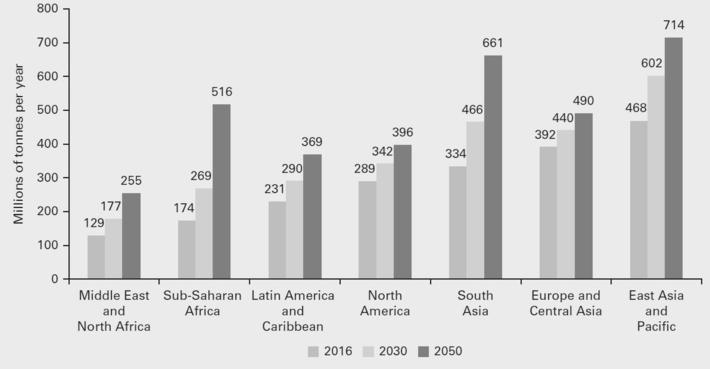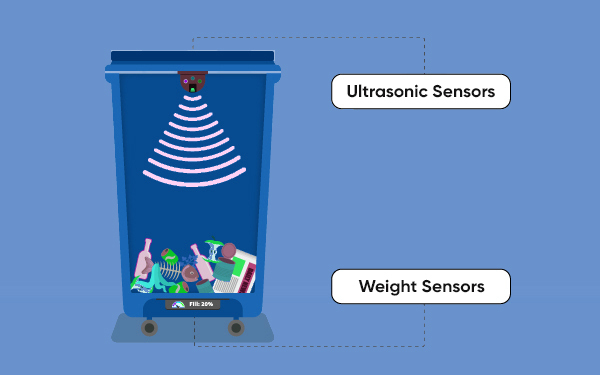 The amount of waste generated in the world amounted to billions (metric tons) in quantity at the end of 2020. With the growing pressure of the human population, it is set to escalate further. In the developed nation, waste management is a profit-making market vertical. Innovative methodologies and techniques are helping make waste management seem an opportunity to bank upon. The sector is steadily progressing at a CAGR of 5.5% annually. Meanwhile, the global waste management market is set to reach USD 2.3 trillion in the upcoming five to six years.
The amount of waste generated in the world amounted to billions (metric tons) in quantity at the end of 2020. With the growing pressure of the human population, it is set to escalate further. In the developed nation, waste management is a profit-making market vertical. Innovative methodologies and techniques are helping make waste management seem an opportunity to bank upon. The sector is steadily progressing at a CAGR of 5.5% annually. Meanwhile, the global waste management market is set to reach USD 2.3 trillion in the upcoming five to six years.
Waste management scenario in the world
In terms of waste management, the sector encompasses – waste dumping, recycling, and minimization. The main categories are segmented as municipal waste, industrial waste, e-waste, plastic waste, biomedical waste, and others, across the world. As per the World Bank report, the regions producing waste across the world are East Asia and the Pacific region. Often, changes in incremental income in low-income levels have resulted in the production of more solid waste and other types of waste; meanwhile, waste production has also been associated with factors like high income and population to add to the numbers.
Here is a snapshot of trends in waste production, especially solid waste category in the past few years and what the leading trends look like, region-wise.

Image credit: datatopics.worldbank.org
Several entities in the waste management domain have emerged in the past few years. By making use of comprehensive processes to deal with escalating waste piles, many firms belonging to North America and European regions especially, are developing techniques to process the waste and are diligently working on waste minimization procedures. In this goal, technology has become integral to handling the burden posed by categories of waste. Some of the leading nations to work towards developing innovative ways for waste handling and minimization are – Germany, Switzerland, Austria, Sweden, Singapore, among others.
Solving waste management concerns
The primary methods used for waste management include landfill, incineration, composting, and recycling. Out of these, incineration and composting help in reducing the volume of waste to a considerable extent. Other methods to tackle waste include disposal at compost areas, volume reductions plants, borrow pit reclamation areas, and processing locations. While landfilling or decomposition contributes to GHG or greenhouse emissions that cause maximum negative effects than harmful carbon dioxide or CO2. As an active contributor in producing GHG, waste decomposition is far more harmful than carbon dioxide for the environment. Starting from open waste dumps to waste decomposition, the main reason why waste management is mandatory is the deterioration of the environment and human surroundings. Today, it is being helmed as a leading cause of climate change and creating various health risks. Additionally, waste in various forms is posing a great health risk to health workers who are involved in the collection and dumping of the waste on a day-to-day basis.
Although, things are changing fast now with the adoption of practices that are carried out through technological intervention. Technology-led initiatives in waste minimization are influencing the way waste is collected, transported, and sent for recycling. With the onset of internet-of-things or IoT, the possibilities and methods to recycle, upcycle and decomposition processes have become more streamlined and attainable.
The AI-enabled smart waste management
In terms of waste management, traditional waste management techniques have proven to be complex, labor-intensive, and often pose a risk to the life of sanitation workers and staff. On the other hand, a connected ecosystem inspired by IoT has paved the way for the application of AI and Machine Learning models for channeling multiple elements for better Urban Planning and smart cities or cities of the future.
Several developed nations have successfully implemented the AI-enabled waste management infrastructure to reduce waste and process recyclable material. Smart Bins equipped with scanners can scan each and every object discarded by an individual and save the data for transfer remotely through a sensor. The bins can segregate different types of waste like metal, paper, glass, plastic, organic, etc while it gets detected as a frozen inference graph through a camera attached inside with the processing unit. AI programs powered by Machine learning and accurate computer vision training data help in classifying different types of waste images and help in the detection of their categories. Post this, an embedded ultrasonic sensor device also checks the filling level and notifies the owner of the usage. Once the trash bins are filled, the sensors notify centralized waste management systems, which then turn up to collect the waste.

Further, once the collection of trash is done, the Smart Bins are taken to waste processing facilities. Herein, the waste processing facilities working with Artificial Intelligence-based programs, identify the types of waste material and start the segregation on the basis of inference graph data. The segregated waste is sent for the next level of processing for various other methods of waste recycling. Items like metal, cardboard, plastic, wood, and electronic equipment are recycled and made contamination-free for the production of goods.
Last word
The never-ending cycle of waste production and disposal has crippled the existing infrastructure and over-pressurized manpower for a long time. AI-enabled smart waste management systems are a viable answer to the health risks posed, time and energy costs involved in the collection and disposal of waste. With the burden of the growing population and exhaustion of landfill sites, smart waste management has become an imperative and a must-have option to live on a waste-free planet. Not merely this, it will help in tackling waste disposal issues but will also contribute to the creation of a healthier environment. Rather than following decades-old techniques, Smart Waste Management-focused AI applications have opened up new facets to tackle the persistent problem of waste management, especially in countries with swelling populations.
